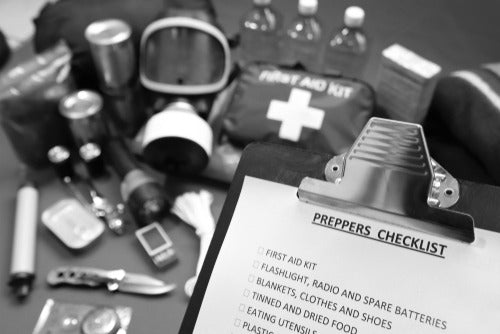
Prepping 101: An Introductory Guide to Preparedness
In a world where uncertainty seems to be the only constant, the concept of prepping has gained significant traction. But what exactly is prepping, why should you consider it, and how can you start? In this comprehensive guide, we'll delve deeper into these questions, providing you with an in-depth understanding of the prepping lifestyle and how to embark on your preparedness journey.
1. What is Prepping?
Prepping, short for "preparing," is the proactive practice of readiness for emergencies or disasters. It involves acquiring the necessary skills, knowledge, supplies, and plans to effectively navigate and survive various crises that may arise, ranging from natural disasters to societal disruptions. Preppers recognise the importance of being self-reliant and prepared for any situation that may arise.
Prepping encompasses a wide range of activities aimed at ensuring survival and resilience in times of crisis. This includes:
- Emergency Supplies: Stockpiling essentials such as food, water, medical supplies, tools, and other necessities to sustain oneself and family members during an emergency.
- Skills Development: Learning a diverse array of skills such as first aid, self-defense, gardening, hunting, fishing, fire-making, shelter-building, navigation, and communication. These skills are vital for survival when traditional infrastructure and services are unavailable.
- Emergency Planning: Creating comprehensive emergency plans tailored to specific scenarios, including evacuation routes, communication protocols, rendezvous points, and contingency plans for various situations.
- Self-Sufficiency: Cultivating independence by growing food, raising livestock, generating energy, purifying water, and acquiring other self-sustaining practices that reduce reliance on external resources.
Prepping is not driven by paranoia or fear but rather by a sense of responsibility and practicality. It empowers individuals and families to face uncertainties with confidence and resilience, knowing that they are prepared for whatever challenges may come their way.
2. Why You Should Prepare
The importance of prepping cannot be overstated, as unforeseen events can disrupt normalcy in an instant. Here are compelling reasons why you should consider preparing:
- Natural Disasters: Earthquakes, floods, fires, storms, and other natural calamities can wreak havoc on communities, leaving them without essential services for days, weeks, or even longer periods. Being prepared ensures that you can weather these storms and emerge resilient.
- Man-Made Crises: Civil unrest, riots, lawlessness, collapse of supermarket supply chains, economic instability, power outages, cyberattacks, terrorist threats, and pandemics are just a few examples of human-induced emergencies that can occur unexpectedly. Prepping equips you with the tools and mindset to navigate such crises with confidence.
- Personal Emergencies: Job loss, medical emergencies, accidents, or unexpected expenses can quickly strain resources, making preparedness invaluable during times of personal crisis. By having a well-thought-out plan and necessary supplies in place, you can mitigate the impact of these challenges.
By preparing in advance, you mitigate risks, reduce vulnerabilities, and increase your chances of survival and recovery in challenging situations. Prepping is not about succumbing to fear but rather about taking proactive steps to secure your future and that of your loved ones.
3. How to Start Prepping
Embarking on your prepping journey may seem daunting, but with a systematic approach, anyone can begin building their preparedness. Here's how to get started:
- Assess Your Risks: Start by identifying potential hazards in your region, considering geographical location, climate, socio-political factors, and historical data on past emergencies. Prioritise preparedness efforts based on these risks.
- Set Goals: Establish realistic goals based on your resources, budget, and timeframe. Begin with short-term objectives, such as creating a basic emergency kit, and gradually expand to long-term goals like building up an emergency food supply and off-grid living.
- Build an Emergency Kit: Start assembling at least a 72-hour emergency kit containing water, non-perishable food, first aid supplies, flashlight, batteries, multi-tool, and essential medications. Gradually expand your supplies to cover extended periods and cater to the needs of all family members, including pets.
- Learn Essential Skills: Invest time in learning fundamental survival skills such as first aid, self-defense, fire-making, shelter-building, navigation, foraging, and basic medical care. Take courses, attend workshops, read books, and practice these skills regularly to build proficiency.
- Connect with Community: Join local prepping groups, online forums, or social media communities to connect with like-minded individuals. Networking with others who share your interests provides valuable opportunities to exchange knowledge, resources, and support. Collaborate on group projects, share tips, and participate in training exercises to enhance your preparedness network.
- Stay Informed and Adapt: Stay updated on current events, emerging threats, and advancements in preparedness technology. Follow reputable sources of information, participate in drills and simulations, and continuously reassess your plans to adapt to evolving circumstances. Remain flexible and open-minded, incorporating new strategies and technologies as they become available.
Remember, prepping is a journey, not a destination. Start small, stay committed, and gradually expand your preparedness efforts over time. Celebrate your progress and accomplishments along the way, knowing that each step brings you closer to a more secure and resilient future.
In conclusion, prepping is a proactive approach to safeguarding yourself, your loved ones, and your community against unforeseen emergencies. By understanding what prepping entails, recognising its importance, and taking concrete steps to prepare, you can face the future with confidence and resilience.

Leave a comment